The Lessons of History by Will & Ariel Durant is a concise, thirteen-chapter short book on the pivotal moments in human civilization. The book goes through the thirteen most essential areas and presents the main ideas from each one.
Book Title: The Lessons of History
Author: Will & Ariel Durant
Date of Reading: March 2018
Rating: 10/10
What Is Being Said In Detail:
The Lessons of History is divided into thirteen chapters, each of them covering an important facet of human civilization.
The chapters are:
- Chapter I – Hesitations
- Chapter II – History and the Earth
- Chapter III – Biology and History
- Chapter IV – Race and History
- Chapter V – Character and History
- Chapter VI – Morals and History
- Chapter VII – Religion and History
- Chapter VIII – Economics and History
- Chapter IX – Socialism and History
- Chapter X – Government and History
- Chapter XI – History and War
- Chapter XII – Growth and Decay
- Chapter XIII – Is Progress Real?
Most Important Keywords, Sentences, Quotes:
Chapter I – Hesitations
“In 1909 Charles Peguy thought that “the world changed less since Jesus Christ than in the last thirty years”
“We must operate with partial knowledge, and be provisionally content with probabilities; in history, as in science and politics, relativity rules, and all formulas should be suspect.”
Chapter II – History and the Earth
“But a tornado can ruin in an hour the city that took a century build; an iceberg can overturn or bisect the floating to palace and send a thousand merrymakers gurgling to the Great Certainty.
Let rain become too rare, and civilization disappears under sand, as in Central Asia; let it fall too furiously, and civilization will be choked with jungle, as in Central America.”
“The influence of geographic factors diminishes as technology grows.”
Chapter III – Biology and History
“So the first biological lesson of history is that life is competition. Competition is not only the life of trade, it is the trade of life peaceful when food abounds, violent when the mouths outrun the food.”
“The second biological lesson of history is that life is selection.”
“Since Nature (here meaning total reality and its processes) has not read very carefully the American Declaration of Independence or the French Revolutionary Declaration of the Rights of Man, we are all born unfree and unequal: subject our physical and psychological heredity, and to to the customs and traditions of our group; diversely endowed in health and strength, in mental capacity and qualities of character.”
“Inequality is not only natural and inborn, it grows with the complexity of civilization.”

“If we knew our fellow men thoroughly we could select thirty per cent of them whose combined ability would equal that of all the rest.”
“Nature smiles at the union of freedom and equality in our utopias. For freedom and equality are sworn and everlasting enemies, and when one prevails the other dies.
Leave men free, and their natural inequalities will multiply almost geometrically, as in England and America in the nineteenth century under laissez-faire. To check the growth of inequality, liberty must be sacrificed, as in Russia after 1917.”
“only the man who is below the average in economic ability desires equality; those who are conscious of superior ability desire freedom; and in the end superior ability has its way.”
“The third biological lesson of history is that life must breed.”
“Ideally parentage should be a privilege of health, not a byproduct of sexual agitation.”
“But much of what we call intelligence is the result of individual education, opportunity, and experience; and there is no evidence that such intellectual acquirements are transmitted in the genes.”
Chapter IV – Race and History
“Environmental advantages (argued Gobineau) cannot explain the rise of civilization, for the same kind of environment (e.g., soil-fertilizing rivers) that watered the civilizations of Egypt and the Near East produced no civilization among the Indians of North America,”
“According to Grant the “Sacae” (Scythians?) invaded India, developed Sanskrit as an “IndoEuropean” language, and established the caste system to prevent their deterioration through intermarriage with dark native stocks.”
“He wisely conceded that the Mediterranean “race,” while inferior in bodily stamina to both the Nordics and the Alpines, has proved superior in intellectual and artistic attainments; to it must go the credit for the classic flowering of Greece and Rome; however, it may have owed much to intermarriage with Nordic blood.”
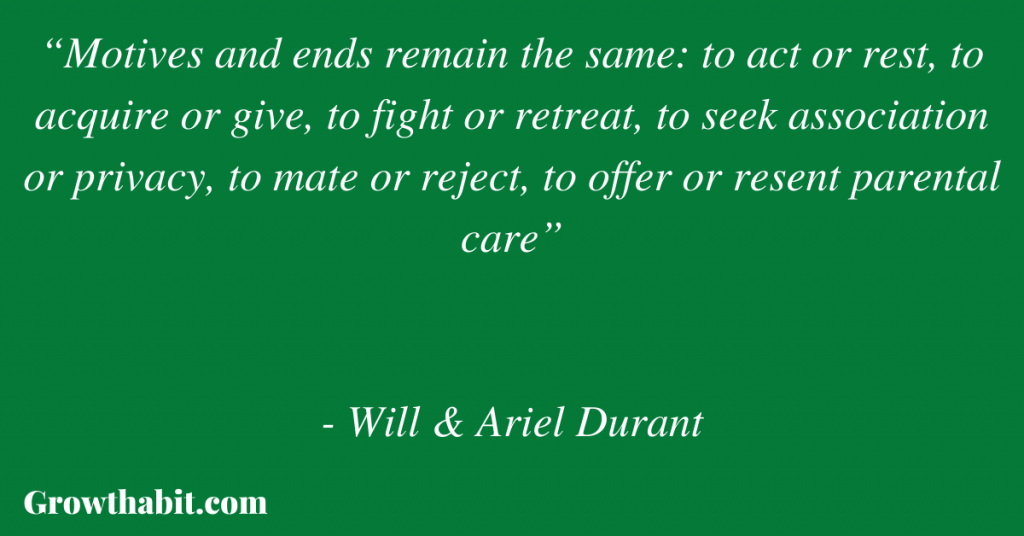
“A Chinese scholar would remind us that his people created the most enduring civilization in history-statesmen, inventors, artists, poets, scientists, philosophers, saints from to our own time.
A Mexican scholar 2000 B.C. could point to the lordly structures of Mayan, Aztec, and Incan cultures in pre-Columbian America.
A Hindu scholar, while acknowledging “Aryan” infiltration into north India some sixteen hundred years before Christ, would recall that the black Dravidic peoples of south India produced great builders and poets of their own; the temples of Madras, Madura, and Trichinopoly are among the most impressive structures on earth.
Even more startling is the towering shrine of the Khmers at Angkor Wat. History is color-blind, and can develop a civilization (in any favorable environment) under almost any skin.”
“The South creates the civilizations, the North conquers them, ruins them, borrows from them, spreads them: this is one summary of history.”
Chapter V – Character and History
“Motives and ends remain the same: to act or rest, to acquire or give, to fight or retreat, to seek association or privacy, to mate or reject, to offer or resent parental care”
“Nothing is clearer in history than the adoption by successful rebels of the methods they were accustomed to condemn in the forces they deposed.”
“So the conservative who resists change is as valuable as the radical who proposes it-perhaps as much more valuable as roots are more vital than grafts.”
Chapter VI – Morals and History
“If we divide economic history into three stages-hunting, agriculture, industry-we may expect that the moral code of one stage will be changed in the next.”
“insecurity is the mother of greed,”
“Pugnacity, brutality, greed, and sexual readiness were advantages in the struggle for existence. Probably every vice was once a virtue-i.e., a quality making for the survival of the individual, the family, or the group. Man’s sins may be the relics of his rise rather than the stigmata of his fall.”
“Industriousness became more vital than bravery, regularity and thrift more profitable than violence, peace more victorious than war.”
“The city offered every discouragement to marriage, but it provided every stimulus and facility for sex.”
“History offers some consolation by reminding us that sin has flourished in every age.”

“In the University of Wittenberg in 1544, according to Luther, “the race of girls is getting bold, and run after the fellows into their rooms and chambers and wherever they can, and offer them their free love.”
“men and women have gambled in every age. In every age men have been dishonest and governments have been corrupt; probably less now than generally before.”
“We must remind ourselves again that history as usually written is quite different from history as usually lived”
“So we cannot be sure that the morality of our times is a herald -‘ of decay rather than a painful or delightful transition between a moral code that has lost its agricultural basis and another that our industrial civilization has yet to forge into social order and normality.”
Chapter VII – Religion and History
“Heaven and utopia are buckets in a well: when one goes down the other goes up; when religion declines Communism grows.”
“Nature and history do not agree with our conceptions of good and bad; they define good as that which survives, and bad as that which goes under; and the universe has no prejudice in favor of Christ as against Genghis Khan”
“Atheism ran wild in the India of Buddha’s youth, and Buddha himself founded a religion without a god; after his death Buddhism developed a complex theology including gods, saints, and hell.
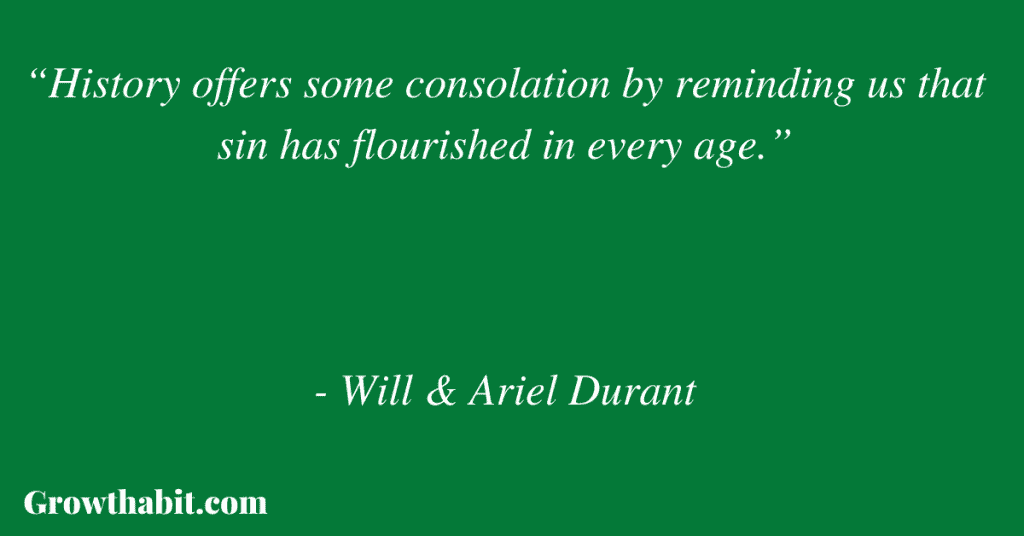
“There is no significant example in history, before our time, of a society successfully maintaining moral life without the aid of religion.”
“If the socialist regime should fail in its efforts to destroy relative poverty among the masses, this new religion may lose its fervor and efficacy, and the state may wink at the restoration of supernatural beliefs as an aid in quieting discontent”
”As long as there is poverty there will be gods.”
Chapter VIII – Economics and History
“Rome with Persia, were attempts of the West to capture trade routes to the East; the discovery of America was a result of the failure of the Crusades.
The banking house of the Medici financed the Florentine Renaissance; the trade and industry of Nuremberg made Durer possible.
The French Revolution came not because Voltaire wrote brilliant satires and Rousseau sentimental romances, but because the middle classes had risen to economic leadership, needed legislative freedom for their enterprise and trade, and itched for social acceptance and political power.”
“We observe that the invading barbarians found Rome weak because the agricultural population which had formerly supplied the legions with hardy and patriotic warriors fighting for land had been replaced by slaves laboring listlessly on vast farms owned by one man or a few.”
”the men who can manage men manage the men who can manage only things, and the men who can manage money manage all.”

“Men are judged by their ability to produce-except in war, when they are ranked according to their ability to destroy.”
“The concentration of wealth is a natural result of this concentration of ability, and regularly recurs in history. The rate of concentration varies (other factors being equal) with the economic freedom permitted by morals and the laws.”
“In progressive societies the concentration may reach a point where the strength of number in the many poor rivals the strength of ability in the few rich; then the unstable equilibrium generates a critical situation, which history has diversely met by legislation redistributing wealth or by revolution distributing poverty.”
“The French Revolution attempted a violent redistribution of wealth by Jacqueries in the countryside and massacres in the cities, but the chief result was a transfer of property and privilege from the aristocracy to the bourgeoisie.”
“The government of the United States, in 1933-52 and 1960-65, followed Solon’s peaceful methods, and accomplished a moderate and pacifying redistribution; perhaps someone had studied history. The upper classes in America cursed, complied, and resumed the concentration of wealth.”
Chapter IX – Socialism and History
“The longest-lasting regime of socialism yet known to history was set up by the Incas in what we now call Peru, at some time in the thirteenth century.”
“challenged by internal disorder and external attack; the people reacted as any nation will react under siege-it put aside all individual freedom until order and security could be restored.”
“Meanwhile capitalism undergoes a correlative process of limiting individualistic acquisition by semisocialistic legislation and the redistribution of wealth through the “welfare state.”
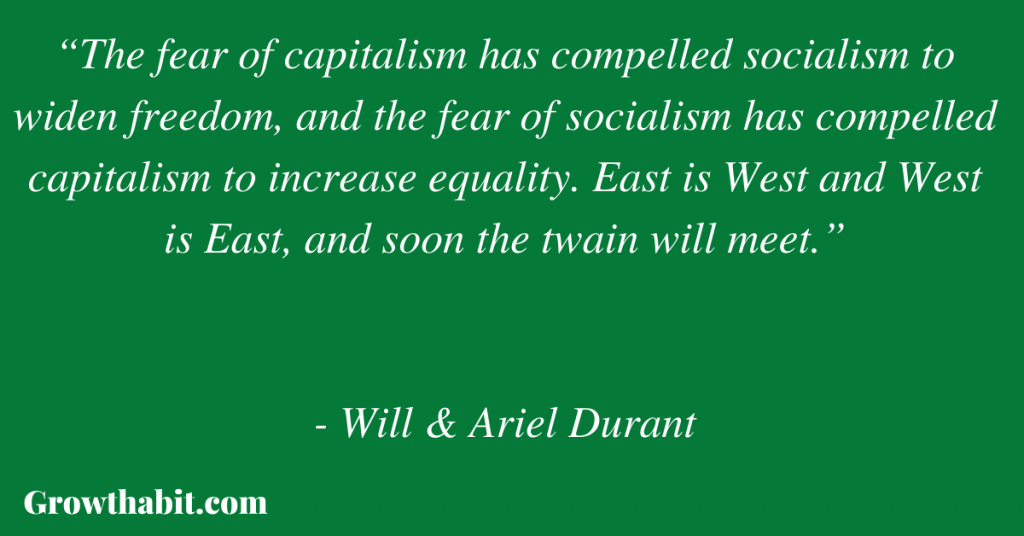
“The Hegelian formula of thesis, antithesis, and synthesis is applied to the Industrial Revolution as thesis, and to capitalism versus socialism as antithesis, the third condition would be a synthesis of capitalism and socialism; and to this reconciliation the Western world visibly moves.”
“The fear of capitalism has compelled socialism to widen freedom, and the fear of socialism has compelled capitalism to increase equality. East is West and West is East, and soon the twain will meet.”
Chapter X – Government and History
“the first condition of freedom is its limitation; make it absolute and it dies in chaos.”
“If we were to judge forms of government from their prevalence and duration in history we should have to give the palm to monarchy; democracies, by contrast, have been hectic interludes.”
“If,” said Gibbon, “a man were called upon to fix the period during which the condition of the human race was most happy and prosperous, he would without hesitation name that which elapsed from the accession of Nerva the death of Marcus Aurelius.
To monarchy was adoptive: the emperor transmitted his authority not to his offspring but to the ablest man he could find; he adopted this man as his son, trained him in the functions of government, and gradually surrendered to him the reins of power.”
“Hence most governments have been oligarchies-ruled by a minority, chosen either by birth, as in aristocracies, or by a religious organization, as in theocracies, or by wealth, as in democracies.”
“But in most instances the effects achieved by the revolution would apparently have come without it through the gradual compulsion of economic developments.”
“The French Revolution replaced the landowning aristocracy with the money-controlling business class as the ruling power; but a similar result occurred in nineteenth-century England without bloodshed, and without disturbing the public peace.”
“There may be a redivision of the land, but the natural inequality of men soon re-creates an inequality of possessions and privileges, and raises to power a new minority with essentially the same instincts as in the old.”
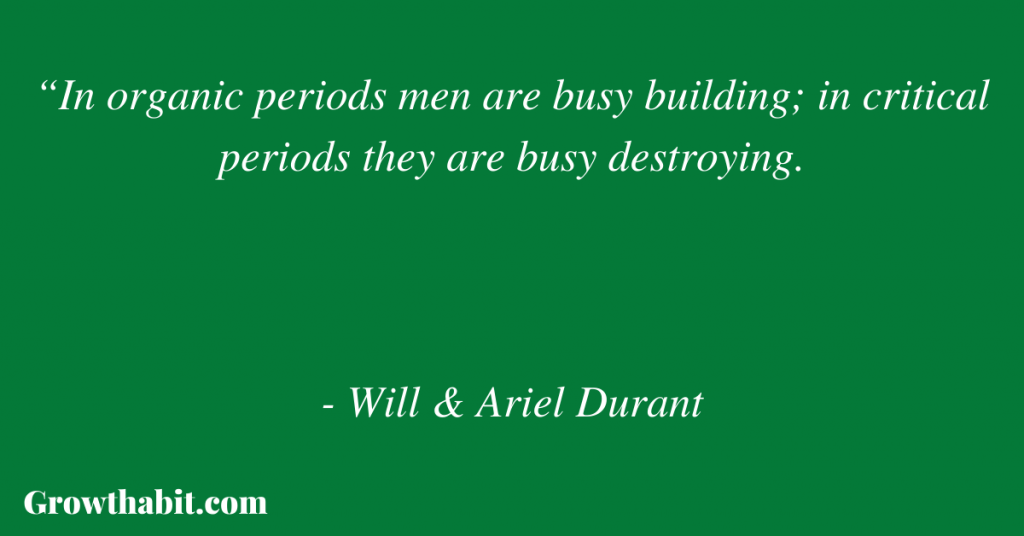
“The only real revolution is in the enlightenment of the mind and the improvement of character, the only real emancipation is individual, and the only real revolutionists are philosophers and saints.”
“In his Republic Plato made his mouthpiece, Socrates, condemn the triumphant democracy of Athens as a chaos of class violence, cultural decadence, and moral degeneration.”
“The excessive increase of anything causes a reaction in the opposite direction;”
“Plato’s reduction of political evolution to a sequence of monarchy, aristocracy, democracy, and dictatorship found another illustration in the history of Rome.”
“Democracy ended, monarchy was restored; the Platonic wheel had come full turn.”
“President Jefferson who was as skeptical as Voltaire and as revolutionary as Rousseau.”
“All deductions having been made, democracy has done less harm, and more good, than any other form of government.”
“If equality of educational opportunity can be established, democracy will be real and justified.”
“The rights of man are not rights to office and power, but the rights of entry into every avenue that may nourish and test a man’s fitness for office and power.”
Chapter XI – History and War
“Peace is an unstable equilibrium, which can be preserved only by acknowledged supremacy or equal power.”
“In every century the generals and the rulers (with rare exceptions like Ashoka and Augustus) have smiled at the philosophers’ timid dislike of war.
“We laugh at generals who die in bed (forgetting that they are more valuable alive than dead), but we build statues to them when they turn back a Hitler or a Genghis Khan.”
“A world order will come not by a gentlemen’s agreement, but through so decisive a victory by one of the great powers that it will be able to dictate and enforce international law, as Rome did from Augustus to Aurelius.”
“States will unite in basic co-operation only when they are in common attacked from without.”
Chapter XII – Growth and Decay
“History repeats itself, but only in outline and in the large.”
“In organic periods men are busy building; in critical periods they are busy destroying.
“On one point all are agreed: civilizations begin, flourish, decline, and disappear-or linger on as stagnant pools left by once life-giving streams. What are the causes of development, and what are the causes of decay?”
“Since inequality grows in an expanding economy, a society may find itself divided between a cultured minority and a majority of men and women too unfortunate by nature or circumstance into herit or develop standards of excellence and taste.”
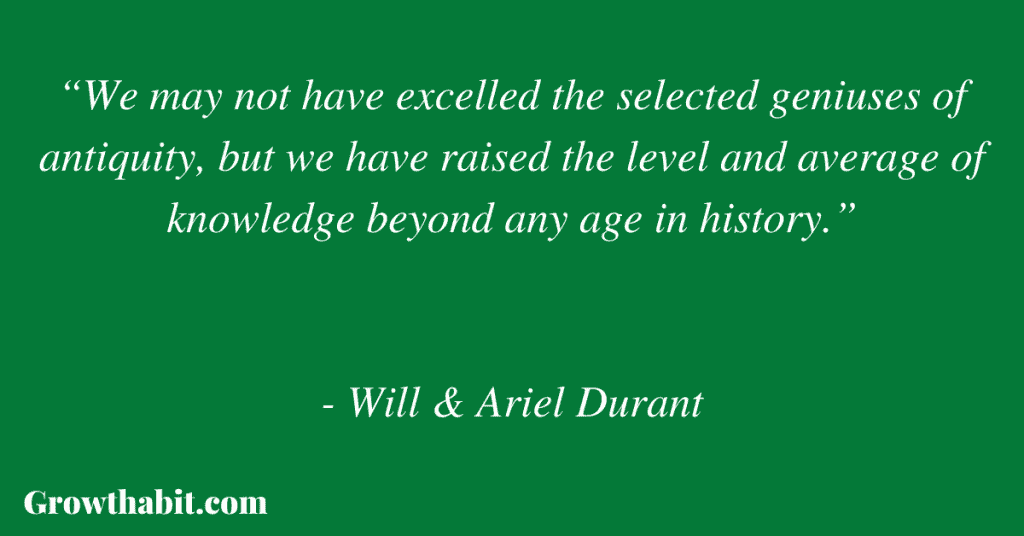
“As education spreads, theologies lose credence, and receive an external conformity without influence upon conduct or hope. Life and ideas become increasingly secular, ignoring supernatural explanations and fears.”
“In ancient Greece the philosophers destroyed the old faith among the educated classes; in many nations of modern Europethe philosophers achieved similar results.
Protagoras became Voltaire, Diogenes Rousseau, Democritus Hobbes, Plato Kant, Thrasymachus Nietzsche, Aristotle Spencer, Epicurus Diderot.”
Chapter XIII – Is Progress Real?
“How inadequate now seems the proud motto of Francis Bacon, “Knowledge is power”!
Sometimes we feel that the Middle Ages and the Renaissance, which stressed mythology and art rather than science and power, may have been wiser than we, who repeatedly enlarge our instrumentalities without improving our purposes.”
“We may presume that at almost any time in history some nations were progressing and some were declining, as Russia progresses and England loses ground today.
The same nation may be progressing in one field of human activity and retrogressing in another, as America is now progressing intechnology and receding in the graphic arts.”
“Our problem is whether the average man has increased his ability to control the conditions of his life.”
“If we take a long-range view and compare our modern existence, precarious, chaotic, and murderous as it is, with the ignorance, superstition, violence, and diseases of primitive peoples, we do not come off quite forlorn.
The lowliest strata in civilized states may still differ only slightly from barbarians, but above those levels thousands, millions have reached mental and moral levels rarely found among primitive men.”
“We may not have excelled the selected geniuses of antiquity, but we have raised the level and average of knowledge beyond any age in history.”
Book Review (Personal Opinion):
This is such a profound book. With only a bit more than a hundred pages, it covers all the important breakthroughs in categories of human civilization.
It’s like every sentence is written as concisely as possible to carry as much information as possible. Once you read this, you will have a much deeper understanding of our past, history, and civilization.
Rating: 10/10
This Book Is For (Recommend):
- A student who always reads additional information in history books
- A millennial who wants to predict what the future will hold (by studying the past)
- A rebel who has a revolutionary attitude toward today’s society
If You Want To Learn More
Here’s an audiobook read by Will Durant
The Full Book
How I’ve Implemented The Ideas From The Book
This book is packed with knowledge and there’s quite a lot I got from the book. The main idea I implemented was actually from the last chapter, “Is Progress Real?”
From there, the author argued that the only real progress is found in an individual’s action/character growth. I even had a website for years in my native language where I wrote articles to help people grow and the focus was on changing society by helping individuals grow.
One Small Actionable Step You Can Do
I rarely do this, but you should really read the book. It’s really short and it will take you less than two hours to go through it, but the lessons from it will be worth it.

